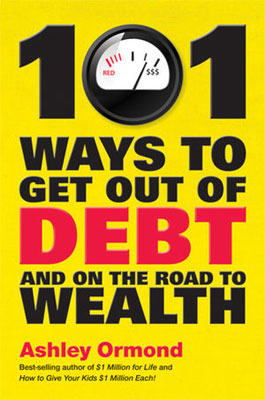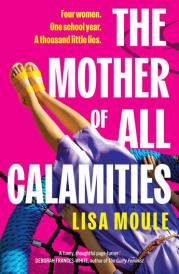101 Ways to Get Out of Debt

101 Ways to Get Out of Debt
In 101 Ways to Get Out of Debt best-selling author Ashley Ormond outlines 101 proven methods anybody can use to get out of debt and on the road to wealth. Each tip is practical and to the point offering readers achievable solutions to get back in the black. No matter how big or complex the debt may seem, 101 Ways to Get Out of Debt provides readers with the tools and inspiration to get their finances into shape and ease financial burdens.
Readers learn:
Readers learn:
101 Ways to Get Out of Debt follows How to Give Your Kids $1 Million Each and $1 Million for Life.
Why did you decide to write this book?
Ashley Ormond: I have been talking and writing about investing and financial markets for many years. One of the things I have always taken for granted is the golden rule that you get out of debt first and then worry about investing. But over the past few years I found that virtually everybody I talked to had mountains of debt. I came across people in their 20s with numerous credit card debt debts, personal loans and phone debts; people in their 30s who still had huge loans for cars, holidays, furniture and audio-visual gear which were long gone; people in their 40s and 50s who still had massive mortgages, plus loans for cars, boats and even loans for kids' school fees; and even people in their 60s and 70s with no investments to retire on because their debts had eaten up their equity in their houses and their superannuation fund balances as well. And almost everybody had a wallet or purse full of credit cards with money owing on them. I thought it was crazy, but somehow it came to be seen as "normal" in the long boom of in the nineties and noughties.
So I had the idea that what most people needed now was some straight-forward, no-nonsense steps to get out of debt - fast.
What are some small tips for those in debt to get out of debt sooner?
Ashley Ormond: There are dozens of little things virtually anybody can do TODAY to get them out of debt sooner. For example if you increase your monthly mortgage payments by just $1 per day (or $31 per month), you will save $15,000 in interest on the average mortgage, and it will pay off the mortgage nearly 1 year sooner. There are dozens of tiny painless things like this that people can use to attack all kinds of household debts. It even covers the main types of investment debts (for property and share investments) and also the main types of small business debts. Most people know they should be doing something about the problem, but they don't know where to start or which debts to attack first. These issues are all set out in the book.
What are debt traps?
Ashley Ormond: The biggest trap is the Mortgage - put every last cent into paying it off ASAP. A mortgage is NOT "good debt" - it is a necessary evil. But somehow there is this urban myth that has developed - that somehow a mortgage is "good debt" - so people are encouraged to load extra things onto their mortgage - like car loans, personal loans, credit card debts, renovations and all sorts of other things. There are all kinds of crazy products like "re-draw" mortgages, "honey-moon" mortgages and "line of credit" mortgages - which are all designed to get more people into more debt and to keep them in debt for longer.
Another major trap is credit cards - the ONLY time to use them is when travelling overseas, when debit cards often don't work. At ALL other times - use a debit card instead. Reward points systems are a waste of money.
Also all those types of debts for things which fall in value or have no monetary value at all - like cars, furniture, clothes, appliances, travel or household expenses - NEVER borrow to buy any of these things.
How can we avoid debt traps?
Ashley Ormond: The basic rules haven't changed in thousands of years - they are: spend less than you earn, never borrow to buy things that depreciate in value, etc. But whas HAS changed is that these days there are all these new ways of getting into debt. For example with the internet we can now buy virtually anything from anywhere in the world, 24/7 using credit cards. It's just too easy to spend money and borrow money, and too hard to save and invest it instead.
The single most important question people should ask themselves BEFORE they buy ANYTHING is to ask: "Do I want to LOOK rich or BE rich?" These days people are under extreme pressure to spend money they don't have - from friends, peers, work colleagues, the media, etc.
Do you think those who's parents teach them about money are better savers?
Ashley Ormond: Most people heard the basic money rules from their parents or grandparents. Unfortunately, most kids don't listen to their parents - and they often do the exact opposite - mostly in their teens and twenties. But I have found that by the time most people have got through the "rebellion" stage of their lives they tend to revert to the values and beliefs of their parents - especially when it comes to attitudes to money. The trick is to come to your senses before you've buried yourself under a mountain of debt!
Another truism is that most people only learn hard way - continuous nagging and lecturing often pushes people to do the opposite.
Is this book going to help those in serious money troubles because of the recession?
Ashley Ormond: Recessions don't "cause" money troubles. The seeds are sown during the good times. Australians had 17 years of continuous economic boom, which should have been used to pay off debt and invest for the future. But we didn't. We just went on a debt-fuelled spending spree instead. It was a debt disaster waiting to happen. In recessions, the music stops and Australians are now left with a mountain of debt to pay off, at a time when unemployment is rising and incomes and asset prices are falling.
But recessions are not all bad news - interest rates are very low, lenders are under pressure themselves and they are keen to negotiate, and it is now "OK" not to have the latest mobile phones, cars, fashions accessories or latest gadget. In fact, going retro and buying second hand is the new "cool".
If so, how?
Ashley Ormond: The book has chapters that cover things like: what to do if you get behind in your repayments, how to talk to lenders, how to get them to change the terms, how to negotiate with lenders, how to avoid your assets being repossessed, how to prioritise your debts, how to come up with a plan. The worst thing to do is do nothing and let your debt problems just drift along. You need to take control and come up with a plan of action. The book sets out how to do this effectively.
Tell us a bit about How to Give Your Kids $1 Million Each and $1 Million for Life:
Ashley Ormond: The first book - "How to give your kids $1 million each" - was about the plan I started for my own two kids. It's about how putting just $1 per day aside from the day they are born can turn into a fortune over time and give them financial security for life. It's not just about the money - it's also about teaching them about money - where it comes from, how to use it, how to manage it and how to invest it.
After the success of that book I received thousands of emails from readers who also wanted to know how they could use the same principles for themselves and not just their kids, so I wrote "$1 million for life". It's about how people of all ages can get their finances in order - including things like saving, investing, spending, borrowing,, investing, superannuation, insurances and so on. It's not about making money - it's about putting it to good use so you can be financially independent - and so you can start doing what you really want to do with your life.
Ashley Ormond started his career as a lender and spent many years as a senior executive in major Australian and international banking groups. He has also consulted to mortgage brokers and originators, and advises businesses on raising capital. As a successful investor in properties, shares and businesses for over 20 years, he has bought numerous investments, and has used - and paid off - many different types of loans from a variety of lenders.
101 Ways to Get Out of Debt
John Wiley & Sons Australia
Author: Ashley Ormond
MORE



